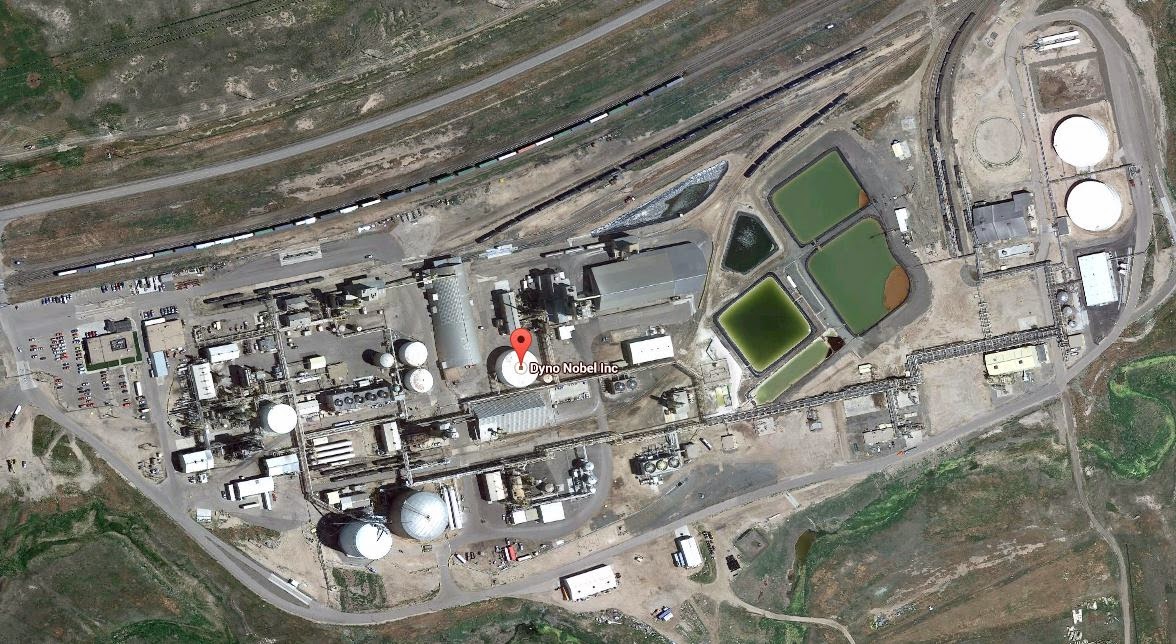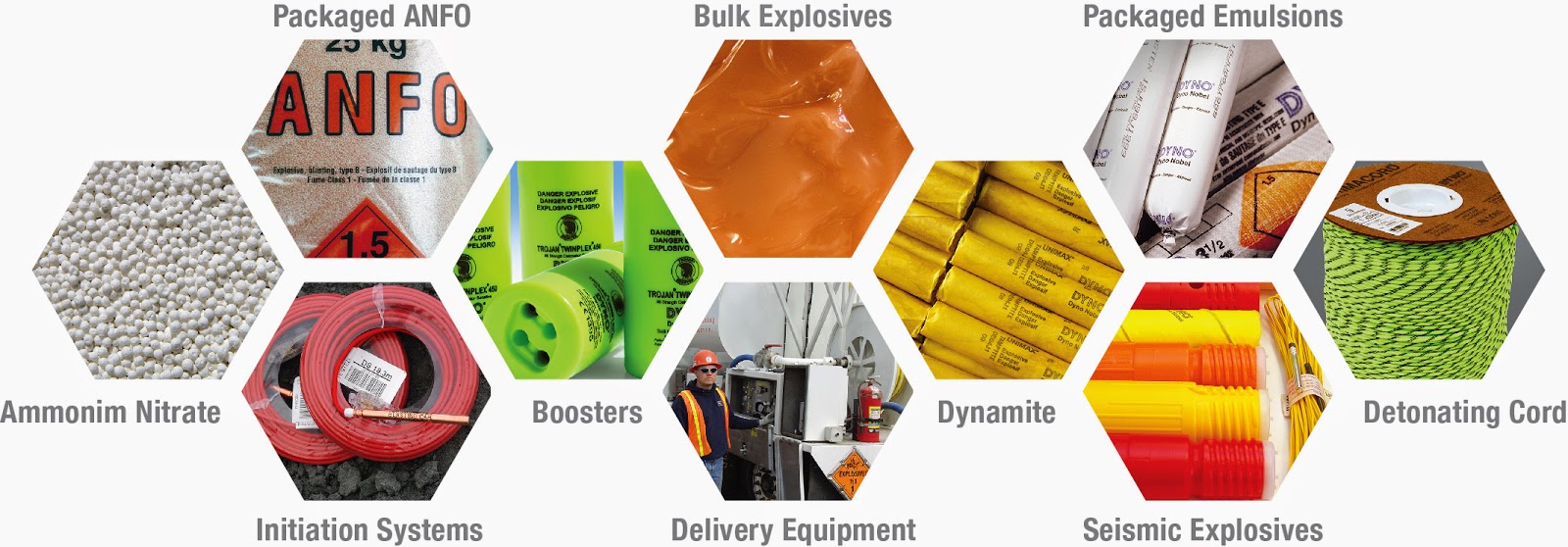FEBRUARY 26, 2015
CHEYENNE, WYOMING
A fire at a chemical
plant near Cheyenne has burned three people.
Laramie County Fire District 1 Chief Darrick Mittlestadt
says firefighters got the call about the fire at the Dyno Nobel plant around
9:30 a.m. Thursday.
He says the company fire brigade at the plant a couple miles
west of Cheyenne had the fire under control by the time county firefighters
arrived.
Mittlestadt says two people were taken by ambulance to a
hospital. The identities and conditions of the victims weren't immediately
available.
Messages left at Dyno Nobel weren't immediately returned.
Dyno Nobel Inc. is a supplier of industrial explosives for
mining and other industries. A worker at the plant in November was hospitalized
after he inhaled ammonia gas through a malfunctioning respirator.
The company was fined in 2011 for a large number of safety violations.
//--------------------------------------------------------------//
In the 1860’s, Alfred Nobel, a Swedish inventor with
355 patents, developed and produced revolutionary and safer explosives products
including dynamite and blasting caps.
Today, we continue this tradition of safety and practical
innovation. We provide explosives
products and blasting services, which combine to deliver groundbreaking
performance for our customers.
With an emphasis on safety,
this wealth of explosives expertise is embedded in more than 3,000 employees
working around the globe.
Blasting is the first step to extracting the minerals that
are essential to many of the products and resources essential for today’s lifestyle.
Our Range of Products
Ammonium Nitrate
Because Ammonium Nitrate (AN) is a primary ingredient in our
bulk and packaged explosives, we own and operate several strategically located
plants where natural gas is converted into AN prills and solution. Our
ability to manufacture and transport more than 1 million tons of AN per year is
vitally important to ensure that a reliable supply is available for our
manufacturing facilities, distributors and customers.
Bulk Explosives
Today 95% of all explosives consumed are delivered in bulk
form. At large scale mines and quarries, specially designed trucks combine the
ingredients and pump or auger them into the borehole.
Bulk explosives range from simple ANFO (ammonium nitrate +
fuel oil) to straight emulsions and include a wide variety of ANFO/emulsion
blends - each with unique performance/cost characteristics.
Packaged ANFO
Where boreholes are dry and the geology is suitable, ANFO, a
mixture of ammonium nitrate prills and fuel oil is the most economical and
commonly used explosive. For small shots, ANFO is premixed and packaged in 50
pound bags
Packaged Emulsions
Our line of packaged emulsion explosives are typically produced
in chub-type cartridges from 1 to 3 inches in diameter. However, paper wrapped
emulsions and larger diameter shotbags are also commonly used. Packaged
emulsions are widely used in quarry and construction work. They have excellent
water resistance and do not contain nitroglycerin
Dynamite
As the only remaining dynamite manufacturer in North
America, we recognize that although emulsions have replaced dynamite in many
applications, dynamite still has performance and reliability characteristics
that make it a superior product for certain demanding blasting applications.
Dynamite is also commonly used as a booster in an ANFO column.
Electric Detonators
Although nonelectric detonators are now widely favored, many
blasters still prefer electric detonators for the ability to test the circuit
before firing the shot. Our electric detonators are manufactured in a range of
precise millisecond and long period delays. This allows the blastholes to
detonate in a predetermined sequence to control ground vibration and improve
rock fragmentation.
Non Electric Detonators
Nonelectric detonators utilize a plastic tube to carry a
signal to the detonator instead of a pair of wires. The inside wall of the tube
is coated with a reactive powder. When ignited, the shock wave travels inside
the tube at 7000 ft per second to the detonator.
The major advantage of nonelectric initiation is its
immunity to potential misfires caused by radio-frequency energy or other stray
electrical charges.
Electronic Detonators
Instead of pyrotechnic delay elements, electronic detonators
utilize microchips to deliver more precise timing to improve blasting results.
Our DigiShot® electronic initiation system is an important advance in
technology, enabling users to achieve accurate benefits of electronic
initiation systems with the easy connections of traditional nonelectric shock
tube systems.
Cast Boosters
Virtually all of today’s bulk explosives (and some packaged
explosives) are not detonator sensitive. That is, a standard strength detonator
fired in the explosive will not cause it to detonate. Boosters amplify the
detonator’s energy to initiate a reliable full-order detonation in the
explosive column. We manufacture a full line of cast boosters in a
variety of types and sizes.
Detonating Cord
For those who require the exceptional strength and
durability of detonating cord in their initiation system, we manufacture a line
of reliable, high quality cord in all of the popular core weights.
Seismic Explosives
The gas and oil exploration industry utilizes specialized
explosives to generate an acoustic wave for seismic data acquisition. We
manufacture a comprehensive line of seismic explosives that are in use by
exploration crews worldwide
Delivery Equipment
We pioneered most of the bulk explosives delivery equipment
in use by the explosives industry today and has always been the leader in
introducing new and innovative explosives delivery systems.
//---------------------------------------------//
DYNO NOBEL WILL PAY A
$110,900 FINE AFTER A FEDERAL INSPECTION UNCOVERED SAFETY VIOLATIONS AT THE
COMPANY'S NITROGEN FERTILIZER PLAN
JULY 11, 2011
CHEYENNE, WYOMING
Dyno Nobel will pay a $110,900 fine after a federal
inspection uncovered safety violations at the company's nitrogen fertilizer
plant here.
The U.S. Environmental Protection Agency announced Monday that the explosives manufacturing company agreed to a settlement to pay the penalty and take steps to improve its emergency preparedness procedures.
The settlement follows an EPA inspection in November that found that the facility, located on Otto Road southwest of Cheyenne, incompliant with several provisions of the federal Clean Air Act.
Specifically, the plant was in violation of safeguards that are intended to prevent or mitigate the accidental release of dangerous chemicals.
David Cobb, an enforcement coordinator for risk management with EPA, said Dyno Nobel failed to identify several hazards at the plant and was not properly prepared to respond to an accident.
In addition, he said the plant's operators got inadequate training to prevent or respond to chemical spills or releases.
Calls to Dyno Nobel's corporate offices were not returned Monday.
Dyno Nobel stores large quantities of hazardous substances, including ammonia and chlorine, at the Cheyenne plant.
Cobb said the violations were severe enough that they could have posed a risk to the surrounding area if an accident occurred.
"It is something I would not call very rare, but these violations did rise to a level for us to take enforcement action to get it resolved quickly," he said.
"It is something we deal with quite a bit on the national level, but I wouldn't say specifically for Wyoming that this would very common."
Cobb said Dyno Nobel officials have been cooperative during the process, and many of the violations have been corrected since the November inspection.
The plant has 180 days to meet full compliance or it could be subjected to more severe penalties.
It is also required to improve maintenance and internal auditing of equipment used to store and process hazardous chemicals.
This is not the first time Dyno Nobel has been fined for violations at the Cheyenne plant.
According to EPA administrative enforcement dockets, it agreed to a settlement to pay a $2,250 penalty stemming from violations discovered in October 2007.
Documents show the company was cited for problems with internal compliance audits and accident prevention programs.
The Australia-based company is a major supplier of industrial explosives and blasting services.
It employs more than 3,000 people worldwide and has 34 manufacturing facilities in Australia, Canada, the U.S., Indonesia, Mexico, South America and Papua New Guinea, according to its website.
The U.S. Environmental Protection Agency announced Monday that the explosives manufacturing company agreed to a settlement to pay the penalty and take steps to improve its emergency preparedness procedures.
The settlement follows an EPA inspection in November that found that the facility, located on Otto Road southwest of Cheyenne, incompliant with several provisions of the federal Clean Air Act.
Specifically, the plant was in violation of safeguards that are intended to prevent or mitigate the accidental release of dangerous chemicals.
David Cobb, an enforcement coordinator for risk management with EPA, said Dyno Nobel failed to identify several hazards at the plant and was not properly prepared to respond to an accident.
In addition, he said the plant's operators got inadequate training to prevent or respond to chemical spills or releases.
Calls to Dyno Nobel's corporate offices were not returned Monday.
Dyno Nobel stores large quantities of hazardous substances, including ammonia and chlorine, at the Cheyenne plant.
Cobb said the violations were severe enough that they could have posed a risk to the surrounding area if an accident occurred.
"It is something I would not call very rare, but these violations did rise to a level for us to take enforcement action to get it resolved quickly," he said.
"It is something we deal with quite a bit on the national level, but I wouldn't say specifically for Wyoming that this would very common."
Cobb said Dyno Nobel officials have been cooperative during the process, and many of the violations have been corrected since the November inspection.
The plant has 180 days to meet full compliance or it could be subjected to more severe penalties.
It is also required to improve maintenance and internal auditing of equipment used to store and process hazardous chemicals.
This is not the first time Dyno Nobel has been fined for violations at the Cheyenne plant.
According to EPA administrative enforcement dockets, it agreed to a settlement to pay a $2,250 penalty stemming from violations discovered in October 2007.
Documents show the company was cited for problems with internal compliance audits and accident prevention programs.
The Australia-based company is a major supplier of industrial explosives and blasting services.
It employs more than 3,000 people worldwide and has 34 manufacturing facilities in Australia, Canada, the U.S., Indonesia, Mexico, South America and Papua New Guinea, according to its website.



